- Serbia
Get to know Serbia
- Citizens
Culture and science
Health services
Pension and disability insurance
- Business
Employment
Economy
- Media
- Government
- Contact
Keep in touch
Contact form
Back
Keepin touch
Whether you have a question, comment, suggestion or any problem in the purview of the government, send us your message and we will try to respond as soon as possible. If your problem is not in our purview, we will forward your message to the relevant institution.
Q:
A:
Serbia could become WTO member by early 2010
Belgrade,
14 April 2009
Deputy Prime Minister and Minister of Economy and Regional Development Mladjan Dinkic expressed his expectation that if parliament adopts all the necessary laws this year, Serbia could become a member of the World Trade Organisation (WTO) at the beginning of next year.
Dinkic stated that this consists of 54 laws, most of which have already entered parliamentary procedure.
He recalled that Serbia started negotiations with the WTO on February 4, 2005, noting that WTO membership is important for EU accession.
Once it becomes a WTO member, Serbia’s investment rating will increase and investors will regard us as a stable country, Dinkic said.
Dinkic said that the adoption of these laws is necessary because of the harmonisation of local laws within EU and WTO regulations.
He said that the bill on technical standards for products and harmonisation assessment is crucial for setting up an interior market in line with EU standards, adding that it gives technical regulations for each product that the state produces.
He explained that the main reason for adopting this bill is the safety and protection of people’s health and the protection of property, consumers, animals and plants, noting that it is the obligation of the producer to deliver products to the market only if they are in line with technical regulations.
Dinkic reiterated that the bill is very important because unless it is adopted, not a single product made in Serbia can be exported to the EU, adding that its adoption is one of the basic preconditions for Serbia’s EU membership.
He specified that the level of trade in the first quarter of 2009 is equal to that of 2007 and that the foreign trade deficit has been reduced by 30%.
The bill on tourism will regulate tourism planning and development, organisations for the promotion of tourism, the work of tourist agencies and the issue of a tourism tax, said the Deputy Prime Minister, adding that the bill envisages planning and development of tourism, because without that there can be no revenue.
Dinkic said that tourism in Serbia has been neglected for a long time, specifying that Serbia’s revenue from tourism last year stood at around $1 billion.
He recalled that Serbia started negotiations with the WTO on February 4, 2005, noting that WTO membership is important for EU accession.
Once it becomes a WTO member, Serbia’s investment rating will increase and investors will regard us as a stable country, Dinkic said.
Dinkic said that the adoption of these laws is necessary because of the harmonisation of local laws within EU and WTO regulations.
He said that the bill on technical standards for products and harmonisation assessment is crucial for setting up an interior market in line with EU standards, adding that it gives technical regulations for each product that the state produces.
He explained that the main reason for adopting this bill is the safety and protection of people’s health and the protection of property, consumers, animals and plants, noting that it is the obligation of the producer to deliver products to the market only if they are in line with technical regulations.
Dinkic reiterated that the bill is very important because unless it is adopted, not a single product made in Serbia can be exported to the EU, adding that its adoption is one of the basic preconditions for Serbia’s EU membership.
He specified that the level of trade in the first quarter of 2009 is equal to that of 2007 and that the foreign trade deficit has been reduced by 30%.
The bill on tourism will regulate tourism planning and development, organisations for the promotion of tourism, the work of tourist agencies and the issue of a tourism tax, said the Deputy Prime Minister, adding that the bill envisages planning and development of tourism, because without that there can be no revenue.
Dinkic said that tourism in Serbia has been neglected for a long time, specifying that Serbia’s revenue from tourism last year stood at around $1 billion.
-
 Belgrade, 4 January 2026
Belgrade, 4 January 2026Violation of UN Charter has become dominant principle of contemporary politics
-
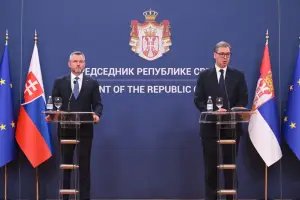 Belgrade, 21 December 2025
Belgrade, 21 December 2025Strengthening cooperation with Slovakia in many areas
-
 Belgrade, 21 December 2025
Belgrade, 21 December 2025President of Slovakia ceremonially welcomed in front of Palace of Serbia
-
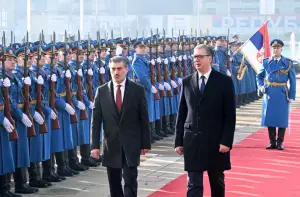 Belgrade, 18 December 2025
Belgrade, 18 December 2025Vučić welcomes President of Georgia in front of Palace of Serbia
-
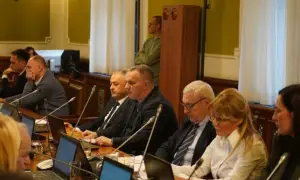 Belgrade, 15 December 2025
Belgrade, 15 December 2025Serbia needs strong, stable education system
-
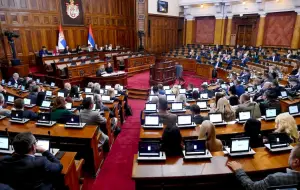 Belgrade, 3 December 2025
Belgrade, 3 December 2025Parliament adopts 2026 budget
-
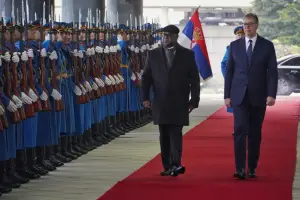 Belgrade, 28 November 2025
Belgrade, 28 November 2025Serbian President welcomes President of DR Congo
-
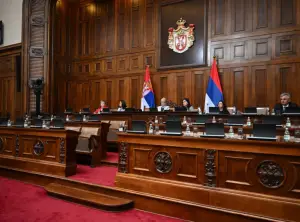 Belgrade, 7 November 2025
Belgrade, 7 November 2025Parliament adopts multiple laws
-
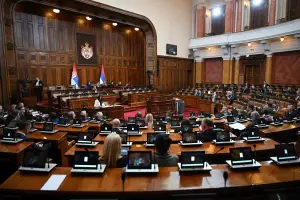 Belgrade, 22 October 2025
Belgrade, 22 October 2025Parliament adopts several laws, ratifies multiple international agreements
-
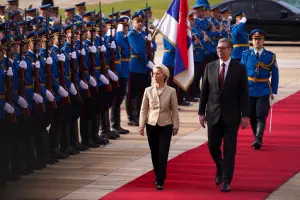 Belgrade, 15 October 2025
Belgrade, 15 October 2025Vučić welcomes Ursula von der Leyen in front of Palace of Serbia
